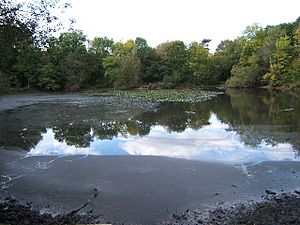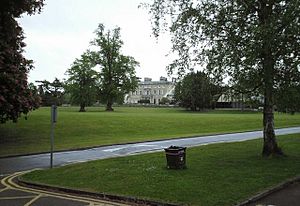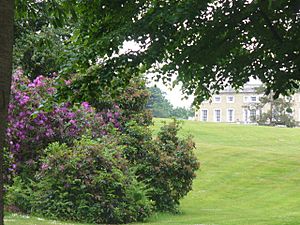Ashtead Park facts for kids
Quick facts for kids Ashtead Park |
|
|---|---|

Upper Pond
|
|
| Type | Local Nature Reserve |
| Location | Ashtead, Surrey |
| OS grid | TQ 192 585 |
| Area | 24.2 hectares (60 acres) |
| Managed by | Surrey Wildlife Trust |
Ashtead Park is a large natural area, about 24.2 hectares (60 acres), in Ashtead, Surrey. It's a special place called a Local Nature Reserve. This park is owned by the Mole Valley District Council. It is also cared for by the Surrey Wildlife Trust.
The park has some very old and important buildings. You can also find remains of a Roman building here. There are four lakes or ponds, and even some school playing fields. Ashtead Park is listed as a Grade II historic park. This means it's a very important place with a lot of history.
Contents
History of Ashtead Park
Ashtead Park has a long and interesting past. Many different families have owned the land and houses over hundreds of years.
Ashtead Park House
In 1680, Henry Howard, 7th Duke of Norfolk sold Ashtead Manor. It was bought by Sir Robert Howard. The house stayed in the Howard family for many years. Later, in 1783, it passed to Richard Bagot through marriage.
Richard Bagot hired a famous architect, Sir Thomas Wyatt. Wyatt helped to design the grand front of the house. He used ideas from another architect, Joseph Bonomi. Richard Bagot then changed his name to Howard. The house remained with the Howard/Bagot family for almost 100 years.
In 1880, Sir Thomas Lucas, 1st Baronet bought the house. He spent a lot of money to make it bigger and change parts of it. Sir Thomas Lucas sold it to Pantia Ralli in 1889. After Ralli passed away, the City of London Corporation bought the house in 1924. Since then, it has been used by the City of London Freemen's School. Ashtead Park House is a Grade II* listed building, which means it's very important historically.
Ashtead House
Ashtead House is a large building made of red brick. Parts of this house are very old, possibly from the 1600s or even earlier. It also has additions from the 1700s and late 1800s.
Headmasters House
The Headmasters House is another impressive building. It's also made of red brick. This house is part of the school campus too.
Nature and Wildlife
The nature reserve area used to be part of the large garden of Ashtead House. It is mostly covered by woodland. The ground here is made of a heavy type of soil called London Clay.
The reserve has two ponds. These ponds are home to different kinds of insects. You might spot dragonflies like the broad-bodied chaser and the large emperor dragonfly. You can also see the pretty common blue damselfly flying around.
Images for kids
 | James Van Der Zee |
 | Alma Thomas |
 | Ellis Wilson |
 | Margaret Taylor-Burroughs |




